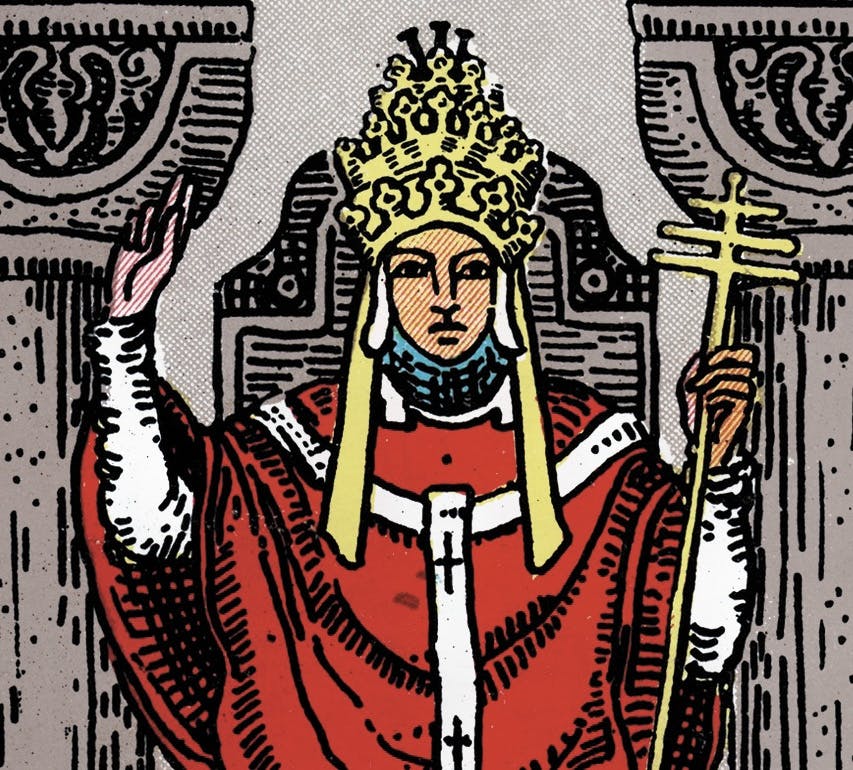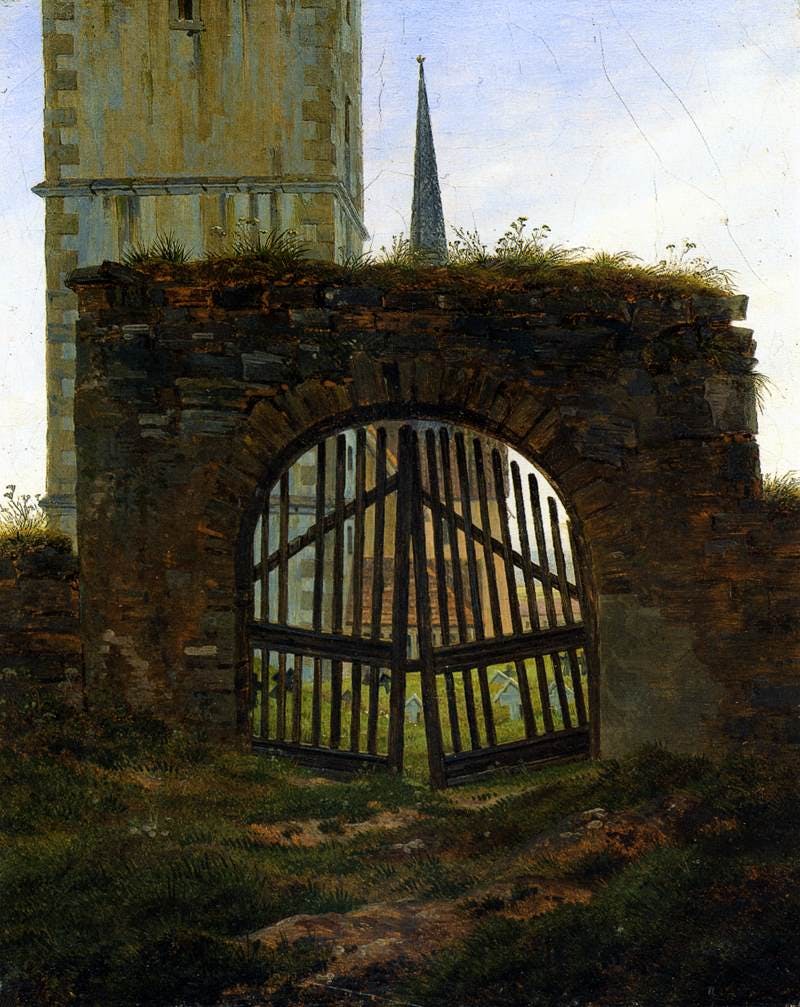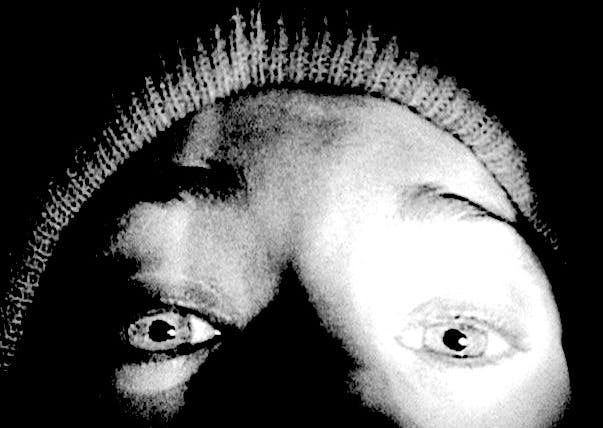Discover Weird Studies
Weird Studies

 Weird Studies
Weird Studies
Author: SpectreVision Radio
Subscribed: 1,569Played: 70,422Subscribe
Share
© 2025 Phil Ford and J.F. Martel
Description
Professor Phil Ford and writer J. F. Martel host a series of conversations on art and philosophy, dwelling on ideas that are hard to think and art that opens up rifts in what we are pleased to call "reality."
SpectreVision Radio is a bespoke podcast network at the intersection between the arts and the uncanny, featuring a tapestry of shows exploring creativity, the esoteric, and the unknown. We’re a community for creators and fans vibrating around common curiosities, shared interests and persistent passions.
225 Episodes
Reverse
In this episode of Weird Studies, we turn to the fifth Major Arcanum, the Hierophant, symbolizing tradition, instruction, and the exoteric aspect of spiritual practice. Drawing on Meditations on the Tarot and other sources, we question the easy opposition between tradition and revolution, exploring instead how inherited forms can foster genuine inner growth, and how an interior revolutions may renew traditions from within.
To reserve seats for Weird Academia events, visit the website of the Center for Possible Minds.
References
Johann Sebastian Bach, F# minor Fugue from The Well Tempered Clavier Book 1 (played by Rosalyn Tureck)
Richard Wilhelm (trans.), The I Ching
J. R. R. Tolkein, The Lord of the Rings
P. D. Ouspensky, The Symbolism of the Tarot
The Catechism of the Catholic Church
Our Known Friend, Meditations of the Tarot
Plato, "The Seventh Letter"
Alejandro Jodorowsky, The Way of Tarot
Dogen, Instructions for the Cook
Gilles Deleuze, Difference and Repetition
Weird Studies, Live at Illuminated Brew Works
Franz Liszt, Hungarian pianist
G. K. Chesterton, Orthodoxy
Samuel Taylor Coleridge, Biographia Literaria vol. 1
Learn more about your ad choices. Visit megaphone.fm/adchoices
For Tolkien, fairy stories are not stories about fairies, but stories that take place in Faerie. And in doing so, they make Faerie present. They are not escapist fantasies but disclosures of a real mode of being and invitations to live in that mode. In this episode, Phil and JF explore the great writer’s radical claims about the nature of story, life, and reality.
Upcoming Events
Erik Davis and JF's six-week course on Herman Melville's Moby-Dick begins on January 20th. For details and to enroll, visit the Weirdosphere.
For information on the upcoming Weird Academia events in Bloomington (Jan 27-29), visit the symposium web page at the Center for Possible Minds.
Music in this Episode
"What a Load of Gnosis," from Weird Studies: Music from the Podcast, Volume I
"Springtime on Ganymede," from Weird Studies: Music from the Podcast, Volume II
References
J. R. R. Tolkein, “On Fairy Stories”
Immanuel Kant, Critique of Pure Reason
Arthur Schopenhauer, The World as Will and Idea
Franz Liszt, Transcendental Etude No. 4: Mazeppa (played by Lazar Berman)
Dogen, "Instructions for the Cook"
Jeff Kripal, Mutants and Mystics
Eric Wargo, From Nowhere
J.F. Martel, Review of “From Nowhere” for Journal of Scientific Exploration
Richard Wagner, Parsifal
Learn more about your ad choices. Visit megaphone.fm/adchoices
To tide us over as we prepare for a new season of Weird Studies, here is an "audio extra," originally recorded for our Patreon supporters, wherein we discuss imposter syndrome, the eternal inadequacy of the intellect, the perils of playing with swords, and the role of trust in
creation.
A new episode will drop on Wednesday, January 14th, 2026. Happy New Year to all.
To join our Patreon, go to www.patreon.com/weirdstudies
To enroll in the upcoming Moby Dick course starting on January 20th, visit www.weirdosphere.org.
For information on the Weird Academia conference in Bloomington, Indiana, visit www.possibleminds.org/weird-academia
Episode image: Caspar David Friedrich, Abtei im Eichwald (1808-1810).
Learn more about your ad choices. Visit megaphone.fm/adchoices
Back in episode 112, Phil and JF devised a gimmick for a show: randomly select one of the many aphorisms in The Book of Probes, a compendium of Marshall McLuhan’s prophetic quips designed by David Carson, and see what happens. It proved lively enough that they’re trying it again nearly a hundred episodes later. The resulting conversation touches the weird across a range of themes: tourism, the two kinds of truth, advertising, Kubrick’s marketing savvy, technology, orality versus literacy, and much more. A fitting feast for the mind as the year draws to a close.
From all of us at Weird Studies, happy holidays.
• Sign up for JF Martel and Erik Davis's upcoming course on Moby-Dick.
• Join Phil, JF, and composer Pierre-Yves Martel for Weirdosphere's Solstice Story Hour on December 21.
• For dates, venues, and the full slate of Weird Academia events in Bloomington this January, visit the Centre for Possible Minds website.
• To participate in the Weird Academia Colloquium, email organizers Emma Stamm and Michael Garfield at elfthoughts@gmail.com
Header Image: NASA.
REFERENCES
Marshall McLuhan, Distant Early Warning Deck
Thomas Mann, The Magic Mountain
Plato, The Seventh Letter
Marshall McLuhan, The Book of Probes
Toronto School of Communication Theory
Walter Ong, Orality and Literacy
Paul Kingsnorth, Against the Machine
Charles Taylor, A Secular Age
Plato, The Republic
Marshall McLuhan, Understanding Media
Jonathan Crary, 24/7
H. P. Lovecraft, The Color out of Space
Learn more about your ad choices. Visit megaphone.fm/adchoices
In this episode, JF and Phil discuss Robert Louis Stevenson’s Gothic classic, the tale that conjured the fog-shrouded London hellscape that has haunted the modern imagination ever since. Though written as a quick “Christmas crawler” to earn a bit of money, the novella has exerted an incalculable influence on art and literature. It also proved strangely prophetic, anticipating Freud and others who would soon make the fragmentation of the human psyche a defining concern of the new century.
"The human is two" is a recurring refrain in the work of the scholar of religious thought, Jeffrey J. Kripal.
References
Dan Ericson, Severance
Robert Louis Stevenson, The Strange Case of Dr. Jekyll and Mr. Hyde
David Lynch (dir.), Mullholland Drive
John Frankenheimer (dir.), The Manchurian Candidate
Galen Strawson, British philosopher
Juan Eduardo Cirlot, A Dictionary of Symbols
Jeff Kripal, How to Think Philosophically
Rouben Mamoullian (dir.), Dr. Jekyll and Mr. Hyde
Weird Studies, Episode 161 on “From Hell”
Sigmund Freud, “The Ego and the Id”
Arthur Machen, Hieroglyphics
Arthur Machen, “The White People”
Learn more about your ad choices. Visit megaphone.fm/adchoices
In this episode, Phil and JF are joined by independent scholar Peter Bebergal, author of Strange Frequencies, Season of the Witch, and other books on the intersections of culture, religion, and the occult. The topic is Frankenstein—not Guillermo del Toro's latest but James Whale's 1931 talkie along with its 1935 sequel, The Bride of Frankenstein, both starring Boris Karloff. The conversation touches on Gnosticism, alchemy, modern techno-hubris, the Gothic, and much more.
Peter's new online course, Hacking the Invisible: At the Intersection of Technology and Magic, begins on November 20th, 2025, and runs for three weeks on Weirdosphere. Visit the Weirdosphere website for details and to enroll.
References
James Whale (dir.), Frankenstein
Tobe Hooper (dir.), Texas Chainsaw Massacre
James Whale (dir.), The Bride of Frankenstein
Justin Sledge, Esoterica
Henry Bergson, Introduction to Metaphysics
David Bohm, Wholeness and the Implicate Order
Mary Shelley, Frankenstein
John the Apostle, The Apocryphon of John
Stuart Gordon (dir.), Stuck
Jennifer Kent (dir.), The Babadook
Stephen T. Asma, On Monsters
Thomas Paine, “The Age of Reason”
Jean Gimpel, Medieval Machine
Learn more about your ad choices. Visit megaphone.fm/adchoices
Originally released in 2018 but remixed for your listening pleasure, here's Phil reading Arthur Machen's classic weird tale, "The White People." Happy Halloween!
Machen's "The White People" was discussed all the way back in Weird Studies episode 3.
Earlier this week, JF and Phil joined Conner Habib on his podcast to talk all about horror. It was a great conversation and we hope you'll give it a listen.
Image: Photo of doll from Auckland War Memorial Museum, via Wikimedia Commons.
Learn more about your ad choices. Visit megaphone.fm/adchoices
For their 200th episode, JF and Phil turn their attention to H. P. Lovecraft’s “The Call of Cthulhu,” a story foundational not only to modern horror fiction but to the very idea of the Weird. In revisiting this tale of forbidden knowledge and cosmic ambiguity, the hosts reflect on Weird Studies itself as a “slow piecing together of dissociated knowledge” that mirrors the work of Lovecraft’s own bewildered protagonists.
Image by Antoni Espinosa via Wikimedia Commons.
Upcoming Events:
Peter Bebergal teaches on Weirdosphere starting November 20, 2025
JF Martel speaks at Back to Haunt Us in East London on November 8, 2025
Phil Ford speaks at the Durations Festival in NYC on November 7, 2025
Phil Ford hangs out at Archestratus Books and Food on November 8, 2025
References
H. P. Lovecraft, The Call of Cthulhu
Weird Studies, Episode 2 on Garmonbozia
Rene Descartes, Meditations on First Philosophy
Phil Ford, “The Wanderer”
H. P. Lovecraft, "Nyarlathotep"
Weird Studies, Episode 74 on Jung
Phil Ford, Jacob Foster, and J. F. Martel, “Care of the Dead”
Weird Studies, Episode 110 on The Glass Bead Game
Weird Studies, Episode 101 on Tanizaki
Graham Harman, Weird Realism: Lovecraft and Philosophy
Weird Studies, Episode 156 on Donna Tartt
Learn more about your ad choices. Visit megaphone.fm/adchoices
Photographer and paranormal researcher Shannon Taggart joins JF and Phil to explore the phenomenon that was Michael Jackson. One of the most brilliant and successful musicians of the modern era, Jackson was also a liminal figure sans pareil, a shapeshifter who defied the binary categories through which we order the human world. His art and persona together enacted a transformation that can only be called shamanic.
About Our Guest:
Shannon Taggart is a photographer and author based in St. Paul, Minnesota. Her photographs have appeared in Newsweek, The New York Times Magazine, and The Wall Street Journal, and have been recognized by Magnum, Nikon, and the Alexia Foundation. Her monograph Séance was first published by Fulgur Press (2019) and reissued in a second edition by Atelier Éditions. Shannon is currently developing an illustrated history of SORRAT (the Society for Research on Rapport and Telekinesis) and hosts an annual symposium on the weird and the paranormal in Lily Dale, New York.
Image by Daniele Dalledonne, via Wikimedia Commons.
References
George Hanson, The Trickster and the Paranormal
Robert Chambers, The King in Yellow
Rogan Taylor, The Death and Resurrection Show
Pier Paolo Pasolini (dir.), Teorema
Phil Ford, “The View from the Cheap Seats at the UFO Show”
Michael Jackson, Moonwalker: A Memoir
J. M. Barrie, Peter Pan
Ursula K. Le Guin, A Wizard of Earthsea
Miguel Connor, The Occult Elvis
Tim Powers, Last Call
Weird Studies, Episode 186 on The Wedge
Raymond Moody, Elvis After Life
Sub Rosa, Spectra Ex Machina: A Sound Anthology of Occult Phenomena 1920-2017 Vol.2
Learn more about your ad choices. Visit megaphone.fm/adchoices
Since 2020, Phil and JF have been creating an on-again, off-again series on the major trumps, or "arcana," of the tarot. In this episode, they continue the series with a discussion of the second arcanum: the High Priestess, also known as la Papesse, the female pope. One of the most enigmatic and powerful cards in the deck, the High Priestess symbolizes duality, contemplation, and manifestation.
Support Weird Studies on Patreon.
Buy the Weird Studies soundtrack, volumes 1 and 2, on Pierre-Yves Martel's Bandcamp page.
Visit the Weird Studies Bookshop
Find us on Discord
Get the T-shirt design from Cotton Bureau.
Listen to Meredith Michael and Gabriel Lubell's podcast, Cosmophonia.
REFERENCES
Our Known Friend, Meditations on the Tarot
Plancia Magna, Roman priestess
Aleister Crowley, The Book of Thoth
Leigh McCloskey, The Tarot Revisioned
Henri Bergson, Matter and Memory
Moina Mathers, French occultist
Sallie Nichols, Tarot and the Archetypal Journey
Rachel Pollack, Seventy-Eight Degrees of Wisdom
Yoav Ben-Dov, The Marseille Tarot Revealed
Learn more about your ad choices. Visit megaphone.fm/adchoices
In a rare surfacing in the contemporary world, JF and Phil discuss a film that has just been released. Bryn Chainey’s Rabbit Trap is psychological horror in the tradition of Repulsion, Jacob’s Ladder, and Angel Heart. But it is more: a metaphysical film exploring the mystery of sound and the Otherworld of Faerie—an excursion into that weird country, so deftly explored by Arthur Machen and Algernon Blackwood, where wonder and terror perform their eldritch duets.
Sign up for JF's new Henri Bergson course, starting September 18, 2025.
Support Weird Studies on Patreon.
Buy the Weird Studies soundtrack, volumes 1 and 2, on Pierre-Yves Martel's Bandcamp page.
Visit the Weird Studies Bookshop
Find us on Discord
Get the T-shirt design from Cotton Bureau.
Listen to Meredith Michael and Gabriel Lubell's podcast, Cosmophonia.
REFERENCES
Bryn Chainey, Rabbit Trap
Weird Studies, Episode 190 on “The Willows”
Alan Crosland (dir.), The Jazz Singer
Weird Studies, Episode 150 on “A Fragment of Life”
Henri Bergson, Time and Free Will
Vladimir Jankelevitch, Music and the Ineffable
Hazrat Inayat Khan, The Mysticism of Sound and Music
Herman Hesse, Siddhartha
J. R. R. Tolkein, The Silmarillion
Giles Deleuze, Cinema II
Robert Kirk, The Secret Commonwealth
Weird Studies, Episode 120 on Radical Mystery (story of the anti-sound starts at 52 minute mark)
Learn more about your ad choices. Visit megaphone.fm/adchoices
Learn more about your ad choices. Visit megaphone.fm/adchoices
We're breaking up our late-summer pause with an audio extra originally recorded for our Patreon supporters. This episode also includes an essay JF wrote on the philosophy of Henri Bergson. A whole course on Bergson's philosophy begins on Weirdosphere later this month.
Weird Studies will be back with a brand-new episode on September 17th.
Learn more about your ad choices. Visit megaphone.fm/adchoices
Of all the flavors of horror, few are as dreadful as that of being lost in the wilderness. In this episode, JF and Phil revisit The Blair Witch Project, the classic 1999 found-footage film that inspired a thousand imitators. What makes this film so gripping, they argue, is the way it lingers over the subtle stages of disorientation in a hostile place, from blithe denial to devastating gnosis. The Blair Witch Project isn't a ghost story so much as a work of cosmic horror. Ultimately, the woods themselves—vast, indifferent, inescapable—are the monster.
Support Weird Studies on Patreon.
Buy the Weird Studies soundtrack, volumes 1 and 2, on Pierre-Yves Martel's Bandcamp page.
Visit the Weird Studies Bookshop
Find us on Discord
Get the T-shirt design from Cotton Bureau.
Listen to Meredith Michael and Gabriel Lubell's podcast, Cosmophonia.
References
Daniel Myrick and Eduardo Sanchez (dirs.), The Blair Witch Project
Gus Van Sant (dir.), Gerry
Martin Heidegger, Being and Time
Weird Studies, Episode 195 on John Keel
Gilbert Simondon, Imagination and Invention
Georgio De Chirico, Italian artist
Arthur Machen, The White People
Jack Zipes, literary scholar
Weird Studies, Episode 150 on Arthur Machen's “A Fragment of Life”
“Schizophonia”
Stanislav Lem, Solaris
Andrei Tarkovsky (dir.), Solaris
Beyond Yacht Rock Podcast
Shirley Clarke (dir.), The Connection
Gilles Deleuze, Cinema 1: The Movement-Image
Learn more about your ad choices. Visit megaphone.fm/adchoices
This marks the third year that Weird Studies is honoured to open the Lily Dale Symposium, organized each summer by photographer Shannon Taggart in the upstate New York community famed for its roots in Spiritualism. While J.F. wasn’t able to attend this year, Erik Davis joined Phil on stage for a conversation about the life and work of John Keel, the iconoclastic writer and investigator best known for The Mothman Prophecies. They were later joined by Keel’s friend, the writer and musician Doug Skinner, for a candid discussion of Keel’s legacy and style.
If you enjoy Weird Studies, please consider supporting us on Patreon. Upper-tier goodies include exclusive writings, regular bonus episodes, and monthly hangouts with JF and Phil.
Learn more about your ad choices. Visit megaphone.fm/adchoices
In this episode, Phil and JF are joined by Meredith Michael—musicologist, podcaster, and Weird Studies production assistant—for a conversation about animal songs. The phrase is intentionally slippery. Are we talking about songs about animals, or songs by animals? Both, as it turns out. Beginning with three very different human compositions—The Beatles’ “Everybody’s Got Something to Hide Except Me and My Monkey,” Hovhaness’s And God Created the Great Whales, and Björk’s “Human Behavior”—the hosts discuss the roles animals play in human music, mythology, and mind. Along the way, they touch on Pink Floyd, the Beatles' trip to India, heroin addiction, the indeterminacy of singing and screaming, the messiness of inter-species communication, the discovery of whale song, the problem of (not) projecting humanness onto animals, the Book of Genesis, and the porous boundary between the human and non-human worlds. All that (and more) for two of the songs! Phil’s pick will be explored in a forthcoming episode.
Meredith Michael is a PhD candidate in Musicology at the Indiana
University Jacobs School of Music. She is working on a dissertation
about musical mythologies of outer space in the twentieth century. In
her spare time she loves making art of all kinds, going for long walks,
making friends with cats, and watching cartoons. Meredith hosts the Cosmophonia podcast with Gabriel Lubell.
References
Victor Shklovsky, “Art as Technique”
Pink Floyd, Animals
Neko Case, "People Got a Lotta Nerve"
The Beatles, "Everybody’s Got Something to Hide Except for Me and my Monkey"
Gavin Steingo, Interspecies Communication: Sound and Music beyond Humanity
Little Richard, "Long Tall Sally"
Alan Hovhaness, And God Created Great Whales
Roger Payne, Songs of the Humpback Whale
Deleuze and Guattari, A Thousand Plateaus
Olivier Messiaen, Quartet for the End of Time
Weird Studies, Episode 181 on “The X Files”
Kate Altizer, Piano Dogs and Whale Theaters: Paranoid Relations and Affect with Nowhere to Go in the Study of Nonhuman Animals and Music
David Rothenberg, Thousand Mile Songs
Frans de Waal, Mama’s Last Hug
King James Bible
Herman Melville, Moby Dick
Leonard Nimoy (dir.), Star Trek IV: The Voyage Home
RILM Abstracts of Music Literature
George Crumb, Vox Balaenae
Terrence Malick (dir.), The Tree of Life
Image by Navin75, via Wikimedia Commons
Learn more about your ad choices. Visit megaphone.fm/adchoices
How do you become religious? What is a conversion experience? Does it happen all at once or gradually? What's the point of religion, anyway? These are questions that JF (a Catholic) and Phil (a Zennist) have often been asked since starting Weird Studies, and in this episode they attempt some answers.
Image: "Small Candle Flame" by Le Priyavrat, via Wikimedia Commons
Sign up to attend Shannon Taggart's Lily Dale symposium, July 24-26
REFERENCES
Ross Douthat, Believe
Dogen, Shobogenzo
New Atheism https://en.wikipedia.org/wiki/New_Atheism
Weird Studies, Episode 99 on “Wild, Wild Country”
William James, Varieties of Religious Experience
George Steiner, Real Presences
Patrick Curry, Art and Enchantment
Max Picard, The Flight from God
Charles Taylor, A Secular Age
James Carse, Finite and Infinite Games
Richard Wagner, Ring Cycle
Gilles Deleuze, The Logic of Sense
Weird Studies, Episode 183 on “Siddhartha”
Charles Sanders Peirce, American philosopher
Leonard Cohen, “Hallelujah”
Our Known Friend, Meditations on the Tarot
Learn more about your ad choices. Visit megaphone.fm/adchoices
Phil and JF first explored the mysteries of walking back in episode 59. That episode felt like a mere introduction—a tentative first step on a long and winding path. Now, 133 episodes later, they return to the theme as they prepare to lead a six-week course on the art of walking and its affinity with the Weird. This conversation touches on meditative walking, walking as dventure, psychogeography, wilderness mysticism, and more.
References
Weird Studies, Episode 59 on Walking
Frédéric Gros, A Philosophy of Walking
Kinhin, walking meditation
Henry David Thoreau, “Walking”
Randonautica, walking app
Johan Huizinga, Homo Ludens
Learn more about your ad choices. Visit megaphone.fm/adchoices
This conversation was originally recorded in August 2024 and released for our Patreon supporters. Weird Studies will be back with a new episode on June 25, 2025.
What is cultural theory? How is philosophy "a preparation for death?"
What sort of planet is Phil Ford from? These burning questions and more
find answers in this free-wheeling conversation, originally exclusive to members of the Weird Studies Patreon.
Learn more about your ad choices. Visit megaphone.fm/adchoices
This special release is a Patreon extra we’re making available to all listeners, in lieu of the official episode originally scheduled for today. As explained in the introduction, we will be back with a full episode later in the month. In the meantime, we hope you enjoy this conversation about how art transforms experience, making the mundane mythic, calling images out of the flux of life, and shaping what is in us to think, feel, and live.
Learn more about your ad choices. Visit megaphone.fm/adchoices
























Around 2022, the Scullys started watching tic toc videos and became ad hoc conspiracy theorists, and Mulders. The Mulders who spent a decade or more, listening to hour long, or more, podcasts, became the Scullys. That's probably over simplification. But the covid/short clip expert era inadvertently flipped reality.
This episode has stayed with me for days. I was actually in my orchard as you read Jung, speaking of fruit, when the reptile part came up, I came to my back porch to find two lizards celebrating spring. Et cetera. Amazing experience. One can sometimes feel guilty being a hermit. But it's a calling, duty, reprimand, and solution. Hard to explain.
Have you ever breathed a frequency.
Take the plank out of your own eye before you try to remove the dust speck from mine.
Is it really necessary to inject politics? Everything you know is wrong.
wonderful discussion guys. I just saw the film for the first time and this was an awesome way to process it afterwards.
Guys, you just keep getting better and better. I work machine maintenance at a USPS DISTRO center and your tangential streams of consciousness (Stream of consciousnesses?) keep getting more and more eerily in line with my various magicks . keep it up.